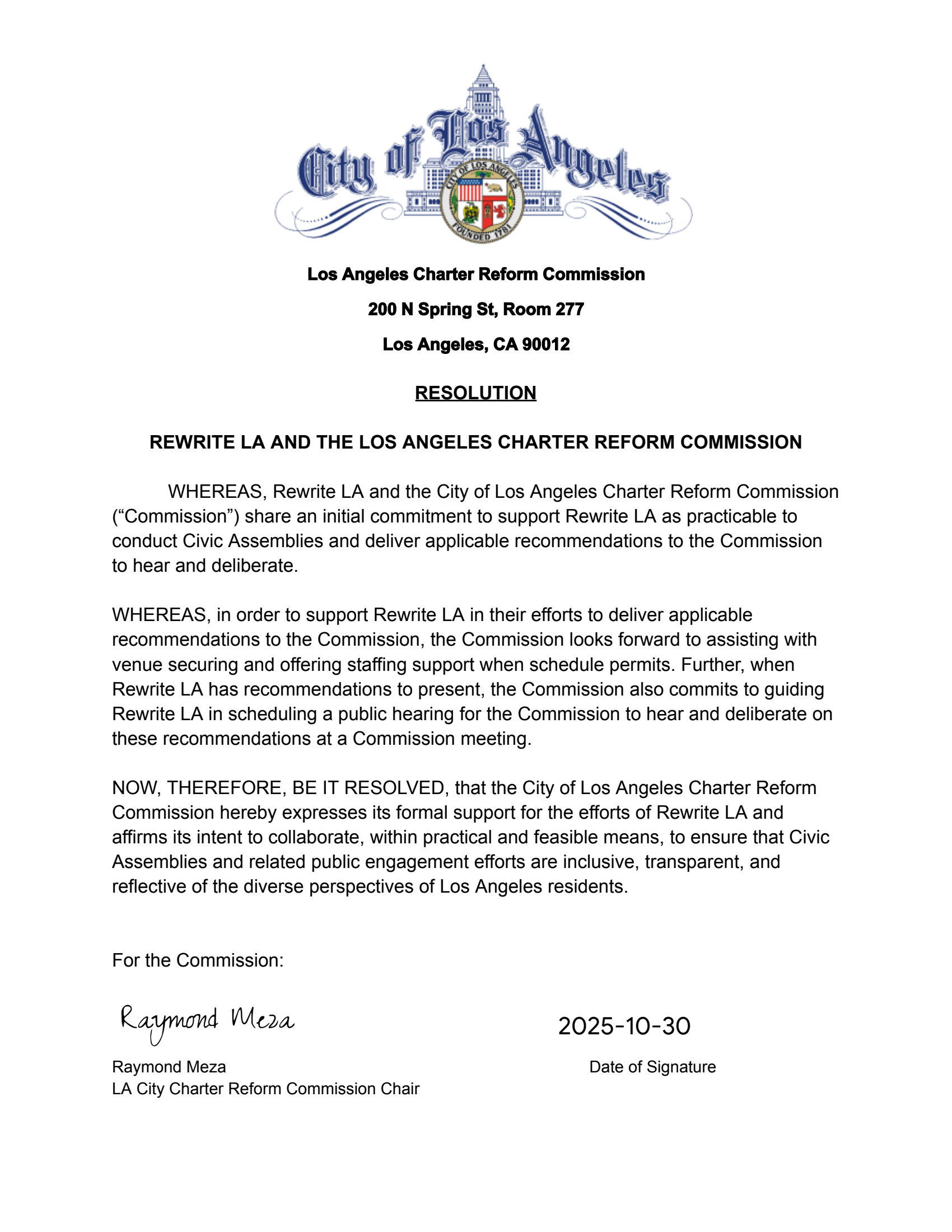Frequently Asked Questions
1. What is charter reform?
The City Charter is Los Angeles’s foundational governing document. It defines how power is distributed, how decisions are made, and how residents can hold government accountable.
Charter reform is the process of reviewing and updating that document to ensure our city government is fair, responsive, and reflective of today’s values and needs. This can include changes to how city leadership is structured, how decisions are made, and how the public can participate.
2. What is the timeline for ReWriteLA’s involvement in the charter reform process?
Charter reform is moving quickly. Here’s a quick look at what’s happening and how ReWrite LA fits in. We’re working alongside the City’s Charter Reform Commission to ensure that public input, assemblies, and digital engagement all feed directly into the city’s decision-making process.
Late Oct – Early Nov 2025: Open topic intake; citywide prioritization; applications for first Mini Assembly (Panelot)
Nov 2025 – Feb 2026: Sortition + preparation for Full Civic Assembly
Dec 2025: Mini Assembly (topic-specific)
Dec 2025: The Commission prioritizes the topics to be deliberated and addressed in 2026. (Rewrite LA will transmit early inputs)
Feb – Mar 2026: Full Civic Assembly deliberation; recommendations refined with public review windows
Early Apr 2026: Final recommendation set submitted to Commission & Council
July 2026: City Council places Charter amendments on the November ballot
Aug – Nov 2026: Public education and transparency reporting; track adoption and edits
Nov 2026: Voters decide on Charter amendments
3. Why does a civic assembly help charter reform?
Charter reform shapes how democracy itself works in Los Angeles, so it’s crucial that the process reflects the voices of everyday Angelenos, not just insiders or interest groups.
A civic assembly allows a diverse group of residents, selected through a fair and representative process, to learn about complex issues, deliberate together, and develop recommendations grounded in shared values and informed discussion.
This approach builds public trust, brings fresh ideas, and ensures reforms are shaped by real community priorities.
4. Where have civic assemblies been used?
Around the world, countries like Ireland, France, and Taiwan are using civic assemblies and digital democracy tools to make government more inclusive, trusted, and effective.
In Belgium, citizens’ assemblies are now integrated into the federal Parliament through deliberative committees where everyday people and elected officials sit together to shape policy.
In Paris, a permanent Citizens’ Assembly made up of 100 randomly selected residents develops proposals that go directly to the Paris Council.
Across the United States, civic assemblies in California, Oregon, Colorado, and other states have brought residents together to deliberate on issues such as housing, healthcare, and climate.
Rewrite LA brings this global democratic innovation home to Southern California, showing that one of the world’s most creative cities can also lead in how democracy works.
5. I want to get involved! How do I do that?
We’re so glad you asked. There will be several opportunities to participate, including mini assemblies, a citywide deliberative platform, and eventually the full civic assembly. You can share what you think the charter should prioritize, and register for our first Mini-Assembly at rewritela.org/deliberate.
Be on the lookout for invitations and announcements about how to join. Whether through sharing your voice online, attending local gatherings, or helping to spread the word, your participation matters in shaping the future of Los Angeles.
